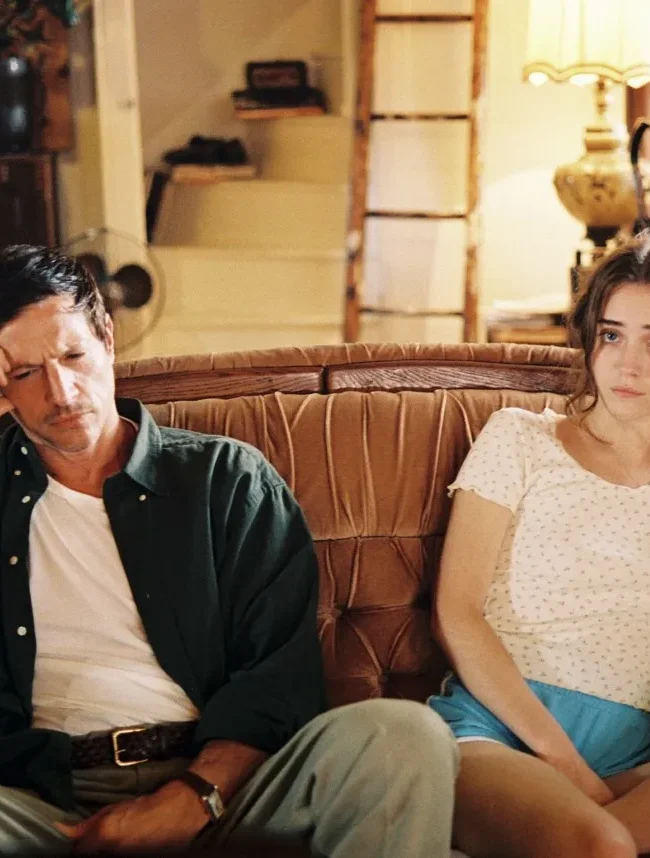(Tony Manero is being distributed by Lorber HT Digital. It opened at Cinema Village on Friday, July 3rd. Visit the film’s official website to learn more.)
The first time I saw Pablo Larrain’s Tony Manero (at its 2008 New York Film Festival press screening), I didn’t quite know how to wrap my head around it. Was it a satire of celebrity obsession run murderously amok? Was it a harsh indictment of General Augusto Pinochet’s brutal dictatorial reign over Chile from 1973-1990? Was it an even harsher critique of the United States, who had backed the 1973 coup that led to the death of President Salvador Allende and subsequent insertion of Pinochet into power? Were we, in fact, to take this psychopathic main character to be a bluntly metaphorical stand-in for Pinochet himself? Or was the film’s political backdrop just that—a backdrop? Was it okay to merely refer to Tony Manero as quite possibly the driest, blackest comedy ever? Having recently watched Larrain’s film for a second time, my opinion is that while those politically metaphorical readings are valid, there’s no need to take things in that direction. For me, Tony Manero’s most striking trait is its feverishly demented tone—a fusion of so many clashing styles that it belongs on a dance floor of its very own.
The year is 1978. The place is Santiago. Pinochet has his citizens cowering under a punishing fist of suppression, yet 52-year-old Raul Peralta (co-writer Alfredo Costa) doesn’t seem to notice. He’s too busy watching Saturday Night Fever over and over and over again in order to better mimic his hero, John Travolta’s Tony Manero. Not only is Raul the leader of a weekly dance troupe at a local cantina, but he’s also gearing up for a nationally televised celebrity impersonator competition. Tony Manero takes place in the week between Raul’s incorrectly showing up for the previous week’s contest (a Chuck Norris showdown) and his eventual performance in front of the studio audience under those bright, potentially star-making lights. In the days leading up to that climax, Raul rehearses his moves, works on fixing his cantina’s broken dance floor, and unsuccessfully tries to get aroused for not just his girlfriend but for her daughter as well. Along the way, he also happens to bludgeon several people to death, but he doesn’t seem to be too troubled by this behavior. The way Larrain presents it, neither should we.
 Reading the above paragraph without having seen the film, it would be hard not to think of Tony Manero as anything but a sketch comedy-esque satire of very silly proportions. Which is why Larrain’s decision to shoot it straight-faced on handheld, oft-blurry, ultra-grainy film stock gives it a dramatic, documentary-like flavor that makes it difficult to swallow as the comedy that it is (seriously, how could this thing not be a comedy?). There aren’t many readily available adjectives that describe Tony Manero’s truly bizarre tone, so I’ll try to explain it another way. After that previously aforementioned press screening, when the lights came up, everyone I made eye contact with had the same expression on their face. It was the gleeful, eyebrow-raised look of employees who had just witnessed their most unhinged coworker snap and unleash a profane-ridden tirade against their absolute douche bag of a boss.
Reading the above paragraph without having seen the film, it would be hard not to think of Tony Manero as anything but a sketch comedy-esque satire of very silly proportions. Which is why Larrain’s decision to shoot it straight-faced on handheld, oft-blurry, ultra-grainy film stock gives it a dramatic, documentary-like flavor that makes it difficult to swallow as the comedy that it is (seriously, how could this thing not be a comedy?). There aren’t many readily available adjectives that describe Tony Manero’s truly bizarre tone, so I’ll try to explain it another way. After that previously aforementioned press screening, when the lights came up, everyone I made eye contact with had the same expression on their face. It was the gleeful, eyebrow-raised look of employees who had just witnessed their most unhinged coworker snap and unleash a profane-ridden tirade against their absolute douche bag of a boss.
However you want to look at him, Raul is one seriously twisted creation. That he shows no real emotion and rarely speaks only enhances the ambiguity of his motivations. In many ways, he comes off more like a robot than a monster. He doesn’t just act without emotion; he appears to act without thought. Of course, he’s committing these crimes for selfish reasons, to attain money or equipment or whatever else might help him achieve his immediate goals, but it’s as if that logic is so deeply suppressed that he’s reacting in a more carnal way, like a hungry dog. By removing morality from the equation, Larrain distances us from being able to more easily pass judgment on the ruthless Raul.
In a psychological sense, Larrain isn’t here to chart the progression of a man whose desperate desire to succeed drives him to commit an eventual murder. Raul is unhinged from the giddy up. Early on, when he spots an old woman getting mugged from his upstairs window, he rushes downstairs to help her get home safely. At this stage, since we don’t know who it is we’re dealing with, we assume the best. But moments, later, in her apartment, after some chitchat, Raul matter-of-factly bashes in her skull, feeds her cat some food before eating the rest himself, and steals the poor woman’s television. Larrain’s observational approach to this disturbing material forces us to simply watch, with a shocking measure of remove, as he commits even more heinous acts. Again, whether or not this character’s actions are in direct correlation to his government’s own behavior is best left for the term papers. I am more concerned with Larrain’s expertly amoral treatment of such an amoral character. As jarring as it seems, this directorial approach is a perfect match for the material.
While it frequently feels lazy or insulting to play the movie look-a-like game, in this case, it might help. The closest comparisons to Tony Manero I can come up with in recent cinema are Ronald Bronstein’s Frownland and Cristi Puiu’s The Death of Mr. Lazarescu. There’s also a very strong fragrance (or is that odor?) of Travis Bickle and Taxi Driver. Yet the hovering presence of Pinochet’s smothering rule adds a layer of sociopolitical intrigue that pushes the film into a place of utter uniqueness. By the time Raul sneaks upstairs to defecate on his rival’s own Saturday Night Fever-esque white suit to prevent him from competing against him, as government authorities question his girlfriend’s daughter downstairs for trafficking in anti-Pinochet paraphernalia… well, if your eyebrows aren’t raised in shocked delight at this strange confluence of elements, all I can say is this probably isn’t the movie for you.
— Michael Tully












Pingback: Hammer to Nail » Blog Archive » DVD RELEASES 2010/6/1
Pingback: Spin-ematical: New on DVD and Blu-ray for 6/1 | movietainment.net
Pingback: HOME VIDEO PICKS – Hammer to Nail